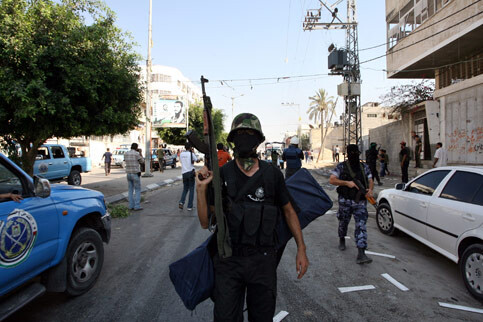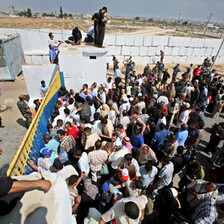Gaza Strip 4 August 2008

Hamas security forces patrol a pro-Fatah neighborhood of Gaza City after clashes reignited between the two groups, 2 August 2008. (Wissam Nassar/MaanImages)
In the past two weeks, the Hamas-dominated interior ministry in Gaza has closed scores of Gaza-based non-governmental organizations (NGOs). According to Al Mezan Center for Human Rights in Gaza City, the Hamas-dominated government has closed 179 institutions in Gaza, including those providing services to women, children and people with disabilities. The closures came in the wake of a deadly car blast almost two weeks ago, in which three Hamas fighters were killed and more than 20 people were wounded.
“I wonder as to why our institution has been sealed off; it has existed for more than five years now, during which about 56,000 young men and women have completed various trainings and attended seminars or workshops,” said Ne’man al-Rify, head of the Shu’a’ Palestinian Youth Development Society, one of the NGOs closed last week.
Al-Rify was filing a compliant with other NGO heads at Al Mezan. He explained, “I am a local leader of Fatah in Gaza City, however my institution has neither been linked with any political faction, nor has it received any funds from any party. The society has been working on development of the local youth, who are the future builders of the Palestinian homeland.”
“The Hamas police forces broke into the society after midnight last Saturday and confiscated 18 computers and the society’s files,” al-Rify added. A similar pattern was observed at the other NGOs closed, leading many human rights groups in Gaza to criticize the closures, and demand that the Hamas government to give a clear-cut justification.
“This is an illegal action, as those who stormed the institutions did not show any legal warrants upon breaking into the offices and seizing their contents. We believe that such a measure was politically-motivated and would only fuel the political division underway between the rival Hamas and Fatah parties,” explained Samir Zaqout of Al Mezan.
Zaqout maintained that his organization showed some sort of understanding to the current tension in Gaza following the bombing. Yet, he made clear, “Civil society organizations have been serving the society at many levels. Therefore, they should be avoided when it comes to political controversy.”
However, the Hamas-led government in Gaza considers the latest closures necessary to prevent further deterioration in the security situation in Gaza. Hamas’s interior ministry said that many of such instructions have been suspected of plotting internal unrest.
“We have been following up and monitoring these institutions before the recent car blast. Right after the incident, we had to move swiftly in order to foil further sabotaging attempts by many of those societies,” explained Ehab al-Ghosain, spokesman of the interior ministry in Gaza.
Al-Ghosain denied that the closures were motivated by the ongoing rivalry between Fatah and Hamas. He stated that “For more than a year now, Ramallah’s [Palestinian] Authority has been cracking down on Hamas supporters or closing Hamas-linked societies, but we have not responded with the same actions. The Gaza closures are meant to prevent potential instability in the coastal Strip.”
He added that “We have not completely sealed off Fatah offices in Gaza, we have not banned Fatah activities. Just one week ago, the Fatah party concluded its internal elections smoothly without our intervention.”
After the bombing, Hamas accused the ousted Fatah party of plotting the attack. Fatah, however, rejected the accusations and argued that the incident was a result of internal Hamas differences. Hamas-led police forces rounded up hundreds of Fatah supporters, including a number of Fatah senior leaders in Gaza, despite the fact that the Palestinian President Mahmoud Abbas ordered the release of Hamas detainees in the West Bank, who were arrested in the same time period by his security services. Abbas also reiterated his June 2008 initiative for dialogue with Hamas in order to end the current split between the two parties.
This is the latest round between the two organizations, which have been at loggerheads since the Islamic Hamas party took power following the 2006 parliamentary elections. In June 2007, Hamas took over Gaza amidst factional fighting with its secular rivals, and expelled Fatah forces from the coastal territory. One month later, President Abbas outlawed Hamas and installed a caretaker government loyal to Fatah in the West Bank. Dialogue between the rival parties has been stalled since.
Rami Almeghari is contributor to The Electronic Intifada, IMEMC.org and Free Speech Radio News. Rami is also a former senior English translator at and editor-in-chief of the international press center of the Gaza-based Palestinian Information Service. He can be contacted at rami_almeghari A T hotmail D O T com.
Related Links





